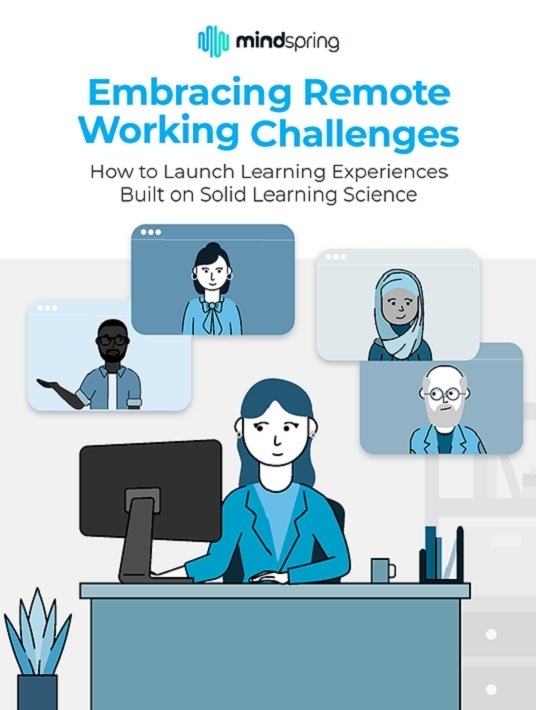Making The Human Connection: Which Psychological Factors Should L&D Pros Have In Mind?
This article is part of a series on overcoming remote working challenges by building learning experiences that are based on solid learning science. What you are about to read is a fable. The company, AshCom, is fictional, but the learning challenges faced by Kathryn, AshCom’s CLO, and her team are real and commonly shared by learning teams in large organizations. It is our hope that you will be able to connect with the characters, their challenges, and the solutions they discover. We also invite you to read the first eBook in the series.

Presenting To The Team
Standing in front of her seated colleagues on the learning team was the last place Martina wanted to be. There was nothing comfortable about any of this. Although she worked closely with the other eight people in the room and considered them friends, she was not used to formally presenting to a group. She kept her notes on the table in front of her instead of holding them in her hands because she didn’t want anyone to notice the shaking.
This was not the first time Martina had presented to the team and she knew that as she got going her nerves would calm and her heart rate would slow. After all, the faces in the conference room were friendly and were going to be engaged in what she would be presenting.
Kathryn, the CLO at AshCom, knew that Martina was going to be a little nervous. So, when she opened the lunch-and-learn session, she took some extra time to remind everyone of the purpose of the meeting and Martina’s unique contributions to the learning team.
“The conversation today,” said Kathryn, “is around virtual learning and learning science with a special focus on psychology. All of you will be leading us through various aspects of learning science in the coming weeks. So, all of you will be standing where Martina is today. I know all of you will appreciate what she has to say.”
Kathryn continued, “You all know that Martina is a sharp and perceptive Instructional Designer. You also know that her creativity is off the charts. She is a true artist, which you know because two of her paintings hang in our hallways. She is passionate about learning. She is less passionate about standing in front of a group of people and presenting.”
Martina blushed a little and laughed while the others joined her. “There are a lot of other places I’d rather be,” said Martina.
Devising The Virtual Learning Solution
“I realize that,” said Kathryn, a little more serious. “But I also know that what you are going to present will be important to this team in figuring out how to provide virtual learning experiences to the remote workforce we plan to develop in the coming months.”
“I hope so,” said Martina. “When I began my research, I got a little lost in trying to define psychology and distinguish it from both brain science and sociology. All have to do with how the brain functions and how people function in groups. They are all looking at the human person from different perspectives, even when they are looking at the very same behavior or aspect of human life.”
“Like ten people painting the same bowl of fruit?” said Maggie.
“Something like that,” said Martina. “There are a lot of ways to approach psychology and various schools of thought about what people actually are like, how they function, what should be studied, and even how to study them. Just to simplify things, I’m using a broad definition of psychology that includes the study of the human mind and human behavior. It seems to me that our emotion, memory, attention, motivation, and interactions are all part of it.”
“If you want to add to that list,” said Martina, “I would be fine with it, but I don’t want to get lost down a rabbit trail on definitions.”
“Agreed,” said Kathryn. “Anyone who wants to have a more academic debate can do that apart from this meeting. Our focus needs to be on what psychology can teach us about virtual learning experiences.”
“And that is where I’d like to go next,” said Martina. “I want to talk about some potential threats and some potential opportunities with virtual learning from a psychological perspective—downsides and upsides, if you would.”
“Let’s start with the potential downsides,” continued Martina. “There has been an enormous shift to virtual learning at every level of education—from preschool up to graduate school. Corporations and nonprofits have leaned heavily into virtual learning and training. So, the good news is that we have some data, and some very smart people are working to analyze its effectiveness.”
“The challenges from a psychological standpoint are at least the following. Actually, I need to clarify something before I write them down. It isn’t that these things automatically spring from virtual learning. It is only that there is some evidence that they tend to be more common among people in virtual learning environments.”
Psychological Factors In Virtual Learning
Martina walked to the whiteboard and wrote:
“Stress
Depression
Frustration
Isolation”
“So, if we go completely virtual in our learning, we are contributing to these things?” asked Alishia.
“Not necessarily,” said Martina. “The research says that these can become more common or occur at higher rates in virtual learning situations. It doesn’t mean that they have to. And if we are careful and thoughtful in our design, we can lower the risk of such things happening.”
“Look,” continued Martina, “I know those words are unsettling. But we need to think about why these have a occur at a higher rate in virtual learning. One obvious cause is technical difficulties. Glitches. Things don’t work the way they are supposed to and there is no one around to help work through them. This is raising frustration and stress for learners at every level. Can we do something about this? Of course we can. We can make sure we catch and eliminate technical glitches. We can also make sure that technical support is available 24/7 to every learner. I think this needs to be part of our solution and it needs to be robust.” “That will add to the expense,” said Kathryn, “but I can’t argue with your point. I had not really thought about that. This is something we need to plan on and budget for.”
“People who can’t get online or can’t get the learning experience to work properly will be frustrated,” said Martina. “They will feel isolated. And they will be stressed about it. These psychological states will do the exact opposite of what we are trying to achieve through virtual learning.”
She continued, “This is not the only difficult factor. Virtual learning, almost by definition, might mean people are alone when they are learning. There is little interaction with other learners or an instructor compared with being in a room full of people. They lack a network of human relationships. They don’t benefit from social learning as much as when they are together with others.”
“So how do we address that?” asked Michael, a former professor who served the AshCom learning team as an advisor. “A huge part of the college experience is being in the setting of a lot of other people who are learning and exploring.”
Martina responded, “I don’t think we can fully replace that experience. Maybe there is some crazy technology coming that will give us the sensation of being in an environment of a lot of learners all together. Virtual reality certainly gets us closer to that than we’ve ever been. But I don’t think we should think of replacing it. We should think about how we mitigate and lessen the downside.
“And how do we do that?” asked Michael.
“I don’t claim to have all the answers,” said Martina, “but I think we can put more effort into chat rooms and interactivity with other learners. We could create learning experiences designed for group participation, even if all the participants are virtual and in separate locations. We need to encourage people to interact with other learners the same way they do on social media. Does a conversation on Zoom give the same experience as having a conversation in a coffee shop on a snowy morning? Not really. But it doesn’t mean that there isn’t a connection. We need to pay careful attention to every experience we create to make sure we are meeting the psychological need for human and personal interaction.”
“So far, it sounds like everything psychological related to virtual learning is negative,” said Alishia, the most recent college graduate. “But I did a lot of my undergraduate work online, and I thought there were a lot of benefits too.”
“Great transition,” said Martina, “and just where I want to go next. There is a lot of opportunity in virtual learning that will be beneficial to our learners at AshCom. Alishia, maybe instead of my listing potential benefits of virtual learning, you can tell us what you appreciated about it?”
The Potential Of Virtual Learning
“I would be happy to,” said Alishia. “In some ways, I found virtual learning to be free from the distractions that are part of the classroom. For us, in the business setting, it might be easier to focus on learning rather than on all the things going on around us when we are onsite.”
“I can see that,” said Michael, the former college prof. “A lot of learners found plenty of distractions in a more formal classroom. They learned better and their minds were clearer in a more isolated setting.”
Alishia continued, “One other thing: In a formal classroom, all the students have to follow the path determined by the teacher or facilitator. When I did virtual learning, I had more choices. I could explore what was of interest to me. I was more motivated to learn if I had more freedom. I imagine that motivation is part of the psychology of learning.”
“Of course,” said Martina.
“Can I add something?” asked Maggie.
Martina nodded. “I’ve been at AshCom a long time. Longer than anyone else here I suppose. It seems like when we have in-person learning, there is a lot of variation in the teaching expertise. Some people get highly skilled facilitators. Others don’t. Learners in the virtual setting all get the same content and same delivery.”
“Sorry to interrupt,” said Kathryn, “but we are out of time for today. I’m happy with this conversation and am learning a lot about virtual learning experiences. I think we all are. We now are fully aware of some potential pitfalls in virtual learning along with some ways we might avoid them. And we have a clear list of potential benefits. This was exactly what I was hoping for from these sessions.”
“Martina,” continued Kathryn, “a special thanks to you. We all appreciate your thoughtfulness and leadership.”
“Next up is Michael, who will cover the learning science of sociology and virtual learning for remote workers. All of you know that Michael spent most of his career in the college classroom, so I’m sure we are in for some serious thinking.” Michael smiled. “Have a great afternoon, everyone.”
Conclusion
Download the eBook Embracing Remote Working Challenges: How To Launch Learning Experiences Built On Solid Learning Science to discover how you can overcome obstacles with targeted solutions backed by learning psychology and proven methodologies. You can also join the webinar to discover which scientific principles are relevant for remote workforce training.


